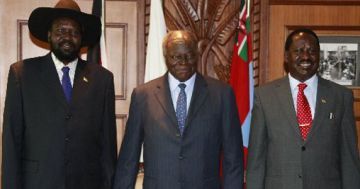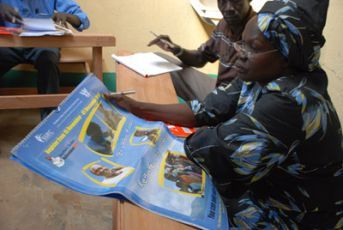FACTBOX: South Sudan Referendum in Kenya
By Muhammad Osman
January 7, 2011 (NAIROBI) – Over 15,000 Southern Sudanese are expected to turn up at eight polling stations across Kenya between 9 and 15 January to vote in a crucial referendum vote on the possible secession of their semi-autonomous region from north Sudan.

It is widely believed that southerners, being aggrieved by the years of civil war and perceived discrimination by successive governments in the north, will vote overwhelmingly for secession.
A turnout of 60% registered voters is required to render the referendum’s results valid whereas the simple majority of 51% will determine the outcome.
Kenya, which shares northern borders with South Sudan, is designated as an Out of Country (OCV) voting and registration center.
Other OCV countries are Australia, Canada, Egypt, Ethiopia, Uganda, the UK and the US. OCV countries were selected on the basis of having a significantly large numbers of southern Sudanese people.
ORGANIZERS
Like in the rest of OCV countries, the referendum in Kenya will be organized by the Khartoum-based Southern Sudan Referendum Commission (SSRC), the official organizing body, with logistical and technical assistance from the International Organization for Migration (IOM)
IOM involvement is pursuant to the Southern Sudan Referendum Act, which tasked the UN-migration arm with enfranchising Southern Sudanese abroad.
REGISTERED VOTERS
Out of the 60,241 southern Sudanese who have registered abroad, a total of 15, 062 voters have registered in Kenya, putting it on top of OCV countries in terms of the number of registered voters.
Voter registration kicked off in Kenya on November 15 and ended on December 8. There were 12 registration centers, including two centers in the capital Nairobi.
On 20 November, a Sudan Tribune report observed that the process at one registration center in Nairobi was proceeding smoothly.
POLLING STATIONS
There are eight polling stations in Kenya.
In Nairobi, where 3,029 Sudanese voters have registered, there will be two stations: one at the Railways Sports Club and the other at the Blue Springs Hotel on Thika Road. Both stations were used as registration centers.
The remaining six stations are spread out as follows: one center in Dadaab town in the North Eastern Province with 171 registered voters, Eldoret Center of the Rift Valley Province with 1,359 voters, one in the western town of Kitale with 502 voters, one in Nakuru with 2,446 voters, and two centers in Kakuma town with a total of 5, 524 voters.

Voters can only vote at the centers in which they registered in order to avoid confusion.
“The important fact that people will be able to vote only where they were registered,” SSRC’s representative in Kenya, Achuoth Philip Deng, said in a press conference attended by Sudan Tribune on January 7.
Explaining the decision, the head of the referendum mission at South Sudan mission in Kenya, Michael Majok, said that “shifting and moving from one place to the next would bring confusion so people will vote from where they initially registered,” according to a report broadcast by Kenya’s Capital FM on January 6.
TIMEFRAME – OPENING HOURS OF POLLING STATIONS
In line with the general timeframe, the voting will take place between 9 and 15 January. Polling stations in Kenya will be open seven days a week from 9 am to 6 pm.
PREPARATIONS
According to SSRC’s representative Achuoth Philip Deng, “the plans for the Referendum are fully set and everything is ready.”
“All the Referendum Centers in Kenya are properly set for voting day” he added. Deng further announced that “IOM has placed an adequate number of the referendum staff all across the country to cover the process.”
The final Referendum Register will be ready on the January 8, one day before the voting starts, according to the SSRC’s representative.
Deng said that the commission had employed civic educators to train voters on the polling procedures, adding that Church groups were also helping in this respect.
SAFETY AND SECURITY
The issue of safety and security stands out as the most valid concern. But the SSRC’s representative assured southerners that the Kenyan police will be deployed to assert security during the entire referendum period and at all polling stations.
“[Kenyan] police forces will be deployed at the Referendum Centers in all eight referendum locations/centers here in Nairobi, Eldoret, Kitale, Nakuru, and in two refugee camps in Kakuma refugee camp in Turkana district, and Dadaab in North Eastern Kenya” he said.
OBSERVATION – MEDIA COVERAGE
The process is expected to be heavily covered by the international, local and regional media. It is also expected that a host of international observers will be present to monitor the vote.
Observers and journalists will not be allowed to access polling stations without prior accreditation from the SSRC. Achuoth Philip Deng urged media groups and observers interested in monitoring the process to obtain and confirm accreditation with the commission, warning that failure to do so will result in denial of access to the Referendum Centers.
FINAL STAGE
After the end of the voting on January 15, the number of votes cast will be counted in each center in the presence of observers. The results will be sent to Khartoum and Juba once the counting is over.
Michael Majok said that “the Southern Sudan Referendum Commissioners together with the Committee of the International Organization for Migration (IOM) will sign the document with the final vote count confirming its authenticity before the results are sent to Sudan.”
(ST)

Facts Check
FACTBOX: South Sudan Referendum in Kenya
You the Southern Sudanese displaced by the genocidal war need to vote 100% for separation. You need to return home instate of developing other countries with the little money we have. Come and build your houses and drive your hummers here in South Sudan if you are blessed to be a family member of one of our beloved corrupt officials who have been sending all the money outside. Even though corruption is bad I am a little bit less harsh to those who steal but invest it here.
God bless South Sudan. I will try to be the first one to case my vote tomorrow for separation just to cancel the vote of traitor Dr. Lual Deng Achuek! Please Lualdit stay in Khartoum after our independence you are useless to us. And don’t lie that you a disciple. try to own up to your ideas!
Peace be on our referendum.